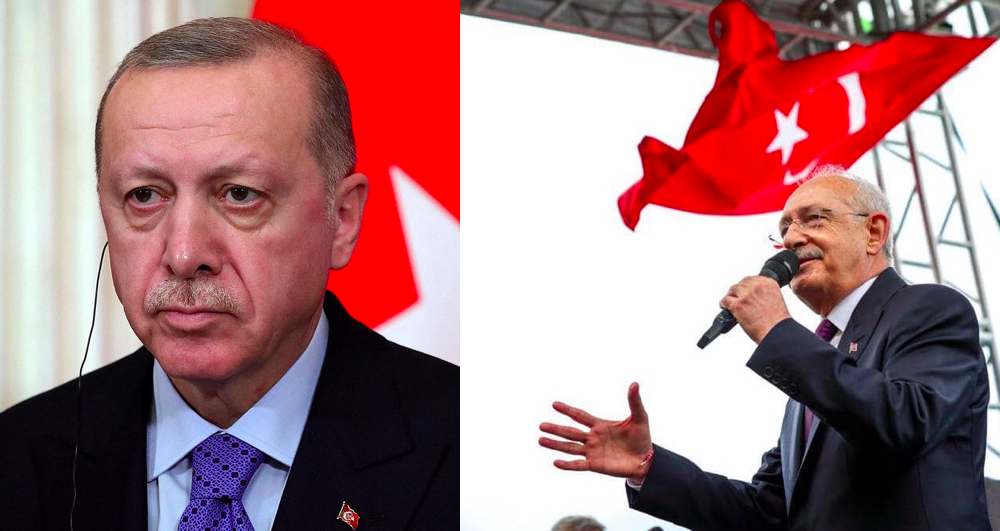What you need to know about the Erdogan-Kilicdaroglu ballot in Türkiye

Today the Turks will elect their new president between Erdogan, in power for twenty years, and Kilicdaroglu, the representative of the opposition. Despite the authoritarian turnaround and the economic disaster, Erdogan – creator of contemporary Turkey – is the favourite. Facts and comments
Today, Sunday 28 May, there will be a runoff in Turkey between Recep Tayyip Erdogan and Kemal Kilicdaroglu: the winner will become the new president. For Erdogan, who obtained 49.5 percent of the votes in the first round, this would be a confirmation for another five years, having been in office since 2014; in fact, he has been in power since 2003, when he became prime minister.
His opponent, Kilicdaroglu (44.9 percent of the votes in the first round on 14 May), is also a well-known name in Turkish politics: for about fifteen years he has been at the head of the Republican People's Party (CHP), the main force opposition to Erdogan's Justice and Development Party (AKP). In the election supported by a coalition of six parties in all. To try to win support among the more nationalist Turks, Kilicdaroglu has begun to use anti-immigrant rhetoric, going so far as to promise the repatriation of the nearly 4 million Syrian refugees present in Turkey.
ISPI wrote that Erdogan's supporters are concentrated "above all in the innermost areas, while Kilicdaroglu is" favored in the cities and strongholds of the west, as well as in the eastern regions of Anatolia with a Kurdish majority.
ERDOGAN CREATED CONTEMPORARY TURKEY
The favorite in the ballot is Erdogan, whose coalition has already obtained the majority of seats in parliament (322 out of 600) and who can count on control of the main information channels such as the state news agency Anadolu . Among other things, the president accused – without proof – Kilicdaroglu of receiving support from the PKK, the Kurdistan Workers' Party, whose armed insurrection since the 1980s has led to the deaths of more than 40,000 people, writes Reuters . Kilicdaroglu denied. The PKK is considered a terrorist organization by Turkey, the United States and the European Union.
Today's elections are very important for Turkey because the current aspect of the country – both in terms of domestic and foreign policy, as well as the economy – has been shaped in the last twenty years precisely by Erdogan, the most longest-lived and most influential since Mustafa Kemal Atatürk founded modern Turkey in the 1920s.
– Read also: Here are Erdogan's successes and disasters in Turkey. Conversation with Marta Ottaviani
However, Erdogan's Turkey is a much less "secular" country than Atatürk's. In addition to having broadened the role of religion, he has also strengthened the powers of the presidency, limited the possibilities for dissent, compressed democratic rights (the repression was particularly strong against the Kurdish minority) and increased political control over the judiciary.
HOW IS THE ECONOMY
From an economic point of view, however, Erdogan is accused of having elaborated an economic policy made up of low interest rates and the devaluation of the lira which had the effect of causing inflation to skyrocket to 85 per cent in 2022, the most in twenty-four years.
However, this critical situation has not caused a collapse of Erdogan's consensus; indeed, in the first round of elections the president obtained a better result than expected. His message "of wanting to put national security above economic challenges seems to have convinced a substantial part of his conservative and nationalist base", explains ISPI. "His campaign videos and events were based on appeals to national pride and showcased Turkey's burgeoning defense industry."
– Read also: Why the economy condemns Erdogan's Turkey. Speak Talbot (ISPI)
FOREIGN POLICY
In foreign policy, Erdogan has relied heavily on the projection of military power, especially in the Middle East, through incursions into Syria, offensives against Kurdish militants in Iraq and the sending of military support to Libya and Azerbaijan. In the Eastern Mediterranean, he has raised tensions with Greece and Cyprus over maritime borders.
Despite being a member of NATO, under Erdogan Turkey behaved in a decidedly ambiguous way, getting very close to Russia and purchasing its missile systems (a fact which led the United States to impose restrictions on the Turkish defense industry, excluding it from the program for F-35 fighter ). On the other hand, it was Turkey that mediated between Russia and Ukraine for an agreement on the resumption of grain exports to the Black Sea.
– Read also: Why Turkey will not give up on Russia. Prof. Donelli speaks
BREMMER'S COMMENT ON THE ROLE AND FUTURE OF Türkiye
Political scientist Ian Bremmer wrote in GZERO that Erdogan's approach to foreign policy has turned Turkey into a "geopolitical swing state ," that is, a country that swings between Western democracies on one side and Eurasian autocracies on the other. . In his opinion, however, this role "will make Ankara a more unreliable ally and will increase the risk of miscalculations. As we have seen in Russia and China, the extreme consolidation of power, the centralization of decision-making and the suppression of dissent are a recipe for bad policies. An unchallenged power means an unchallenged ability to make mistakes."
“A third mandate for Erdogan”, concludes Bremmer, “will lead to a more unstable, authoritarian and unpredictable Turkey. Barring a miracle on May 28, Turkey's future looks bleak."
This is a machine translation from Italian language of a post published on Start Magazine at the URL https://www.startmag.it/mondo/turchia-ballottaggio-erdogan-kilicdaroglu/ on Sun, 28 May 2023 05:04:43 +0000.
